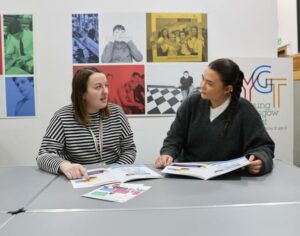Published by The Herald
Written by Stephen Naysmith
Iain Macleod’s past gives him a strong incentive to support the Pathways scheme which helps disadvantaged young people access higher and further education.
Except, as the Strathclyde University social work lecturer points out: “It is never in the past.”
This is powerfully evident when he breaks off, unable to go on, as he tries to tell me about a particular incident between him, his deaf sister and the mother with a drink problem who struggled to look after them.
The memory is too distressing. “It is lifelong,” he adds later, when talking about the impact of being taken into local authority care.
Mr Macleod was part of a large Glasgow family, one of six born very close together, including his youngest sister who contracted meningitis at nine months and was left profoundly deaf.
“My father worked very hard as a manual labourer and my mother stayed at home. She was depressed and had health problems and started drinking.”
This meant that family life was always difficult, he says. “It was about never knowing whether your parent was actually going to be there or not. When she was not drunk there were good times and things were OK but other times it was impossible. She wouldn’t admit there was a problem. It was never resolved, her entire life.”
Mr Macleod ended up living in a series of care settings, as did his siblings. He ended up in a boarding school for socially and emotionally maladjusted children, but one which was selective, and academically-minded.
Previous schools had seen him fall out with teachers. “I was often late. I didn’t like to have to explain why that was in front of everyone in class. Some teachers didn’t get that and I responded by attacking them.”
Taken into care, he remembers begging the authorities not to take his brothers and sisters into care too. “I know what it feels like to have no control,” he says.
Those siblings have fared variously well, he says, “about half have done OK, the other half not so OK.” Despite struggling for long periods, he ultimately thrived, which he puts down in large part to good luck.
“I was disengaged from school but I actually liked school. When things weren’t going well I coped by sitting up reading all night.”
His uncle was able to bring home remaindered books from the publisher Collins. As a boy, he read avidly, anything that turned up. “It went from literary classics to remaindered trash. Pulpy novels to George Orwell’s collected essays.”
School was still a struggle though. He left with no highers, and ended up living independently, too young, at 17. “I didn’t have trouble finding work, first as a shelf stacker, then for Glasgow City Council, but I was still trying to deal with adolescence and the chaos in the family. I became adult very quickly and inappropriately soon. I was overwhelmed.”
His solution was to flee. “I got as far away as I possibly could, working in a specialist unit for older people in Barnet, North London.”
This full-time volunteering was challenging. “They more or less said: ‘see if you can arrest the process of dementia’.”
Ironically, he was living, almost penniless in a children’s home once again. He realised he had more of an affinity working with young people. “One of the house parents encouraged me to go and do A levels – he even gave me £300 to fund it, which was a significant amount then.”
Moving to homeless accommodation in Eastbourne he passed the exams and though he had never thought about university before he applied to study psychology at a London polytechnic. This too was a struggle. “I moved everything I had in one suitcase. I was by myself with no cash.”
The isolation of having nothing, no money, no parental support and no base, leaves you singled out among other students who are going home for holidays such as Christmas, he says. “I ended up operating a small squat, really, in Stratford, putting up anyone who drifted back there. My siblings were still in care when I was at university, things hadn’t improved and my contact with them all was very minimal.”
Such isolation, when you have nothing, no parental support and nobody else to fall back on makes plotting a way forward much harder, Mr Macleod points out.
None of this is said with any degree of self-pity or anger. But there is no doubt that it is one of the key reasons why he became involved in the MCR Foundation Pathways Project, which aims to provide disadvantaged young people in Glasgow, and ultimately across Scotland, with a mentor to help them find routes into further and higher education.
At every step, Mr Macleod says, he can identify key people who played a similar role to help him overcome barriers in his life.
“I wouldn’t have got back into mainstream schooling without support I got from an educational psychologist. There was another member of staff when I was doing full-time voluntary work. At various points there was always someone who fulfilled that role. What makes the difference is having one adult there who isn’t there to judge you, or make judgments about your parents.”
The MCR Pathways Project, already running in five high schools in the East of Glasgow, provides disadvantaged young people with just such a mentor, to help them find the routes forward, and overcome pressures which can make academic goals and forward planning seem a remote possibility.
Already a success, the scheme’s growth depends on recruiting sufficient mentors to satisfy demand and extend it more widely across the city.
The Herald is supporting its drive to find more people who are willing to give a small amount of time on a weekly basis to advising or supporting a young person. Existing mentors come from all kinds of backgrounds and the ability to listen and the motivation to help unlock the potential of a young person are the only qualifications.
Iain MacRitchie, the entrepreneur and philanthropist behind the project argues that 30 years of work haven’t sufficiently improved the prospects for looked after young people in particular. “This can be a bridge from one outcome to another,” he says. “It is really important to get away from the ‘horror stories’ and see that these are young people who have the same homes, dreams and aspirations, but can find them difficult to achieve.”
Mr Macleod says it comes down to a relationship between one person and another.
Mentoring doesn’t have to involve resolving the difficulties in someone’s past, he adds. “It is not about fixing, or solving, just about moving on and looking for a way forwards.”
Note: The above article and associated photography is © Copyright 2014 Herald & Times Group. All rights reserved. This article was originally published on www.heraldscotland.com on 10th May 2014 and has been reprinted with permission.




